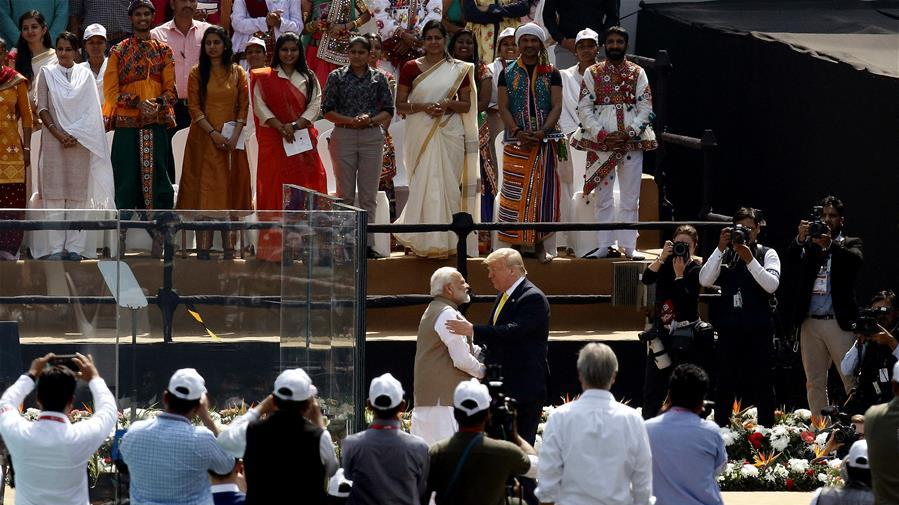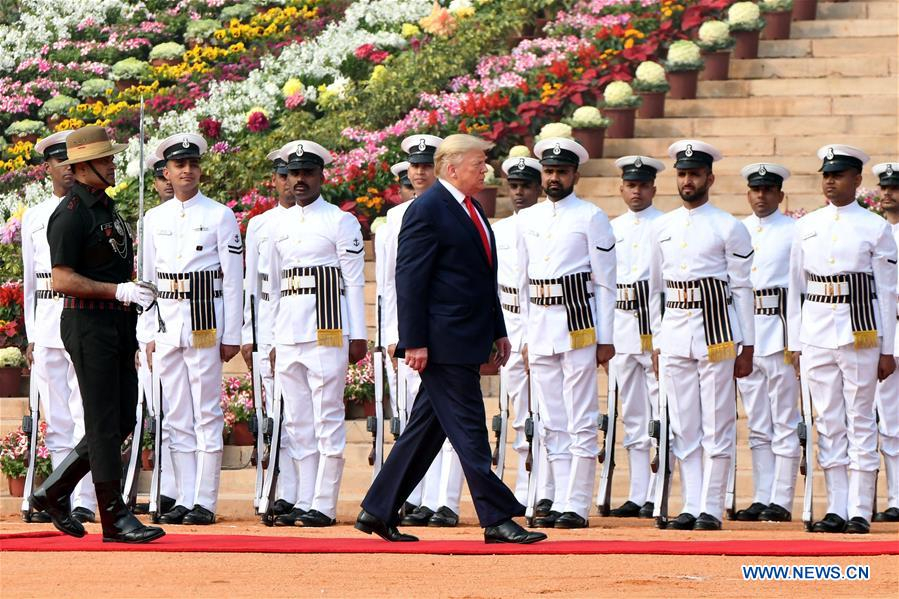
U.S. President Donald Trump and Indian Prime Minister Narendra Modi shake hands at Motera Stadium in Ahmedabad, India, February 24, 2020. /Xinhua
U.S. President Donald Trump and Indian Prime Minister Narendra Modi shake hands at Motera Stadium in Ahmedabad, India, February 24, 2020. /Xinhua
Editor's note: Hannan Hussain is a security analyst at the London School of Economics, South Asia Center, and a writer. The article reflects the author's opinions, and not necessarily the views of CGTN.
President Trump is correct when he says that the India-U.S. relationship is uniquely symbolic. The same week when a historic U.S.-Taliban peace deal is up for signatures, a 7-foot wall erects in India, to honor the efforts of its peace-loving ally. Over 100,000 people chanted "Namaste Trump" in Ahmedabad, Gujarat – Modi's hometown, and site of the 2002 anti-Muslim pogrom, notorious for the pardon of accomplices, like many of Trump's associates on Capitol Hill.
At the world's largest cricket stadium this week, spotlights fell on the Trump-Modi duo: two leaders lifted by the winds of aggressive Hindu nationalism and populist sloganeering. "An exceptional leader... and a man I am proud to call my true friend," said Trump to Modi. India's political press ruled their 36-hour pageant historic.
The two-day visit to India marks Trump's first ever since assuming power. In the lead up to the event, proponents of the India-U.S. alliance ramped up speculations of a "comprehensive trade deal." Nothing of the sort transpired.
In truth, Washington approved 3 billion U.S. dollars in American military equipment sales to New Delhi, largely centered around the Apache and MH-60 helicopters. Trump ruled the purchase an "expansion in defense cooperation," and stressed that both sides had made "tremendous progress on a comprehensive trade agreement." No deadline was announced.
Twelve years ago, such a move would have been detrimental. Gifts of nuclear agreements and wide-ranging concessions made sure that a sense of optimism – and triumph – prevailed on all fronts. But the current visit merits a key difference: Washington can afford to engage with New Delhi without giving much away.
Trade tensions have been ripe since June last year, when the Trump administration terminated India's preferential trade status. The move effectively ended India's trading leverage under the Generalized System of Preferences (GSP) scheme – a framework for tax exemption that benefited New Delhi the most. In a sign of protest, India chose to retaliate with a series of high tariffs on select U.S. products, causing a diplomatic rift to ensue.
An additional layer of strain came in November, with India's purchase of Russian-manufactured S-400 missile systems. The 5-billion-U.S.-dollar deal between Moscow and Delhi emerged in defiance of Washington's threats of sanctioning India.
Not long ago, the U.S. was setting the rules of engagement for key Indian rivals in South Asia. Modi's leadership in particular took pride in its exception. But present trend lines indicate that this policy of dictation, is now coming home.
On the security front, Trump spoke of Washington's counterterrorism operations in conjunction with Pakistan. "Our relationship with Pakistan is a very good one. Thanks to these [counterterrorism] efforts, we are beginning to see signs of big progress with Pakistan," said Trump.

Trump inspects the Indian military guard of honor during the ceremonial reception at the Presidential Palace in New Delhi, India, February 25, 2020. /Xinhua
Trump inspects the Indian military guard of honor during the ceremonial reception at the Presidential Palace in New Delhi, India, February 25, 2020. /Xinhua
There was a catch though: Trump cited a joint counter-militancy "commitment" between India and the U.S. as the primary cause. This is simply not true.
Moreover, Trump referred to joint counterterrorism measures on the "Pakistani border," which must be seen as an extension of high-level military talks currently underway between both countries. Post-withdrawal peace in Afghanistan is a stated priority for Islamabad, which hopes to secure its 2,430-kilometer border with Kabul.
New Delhi is hardly a variable in this process.
Interestingly, in his fixation with Modi's greatness, Trump ended up downplaying almost every facet of Mr. Modi's leadership. Barring the odd mediation stunt, there was no mention of Kashmir: the disputed territory stripped of its autonomy, and buried under one of the deadliest lockdowns of our time. Similarly, there was no mention of the 8 million citizens that occupied the region, all surrounded by a record number of Indian troops – each armed to the teeth.
Trump kept lauding Mr. Modi's role in regional integration, but never once questioned India's absence from key multilateral frameworks in South Asia. He doted on India's "counterterrorism triumphs," yet skipped mentioning Rashtriya Swayamsevak Sangh (RSS) – an Indian militant organization, and parent group of Modi's ruling party.
Meanwhile in Delhi, far-right vigilantes beat up hundreds of fellow citizens over a controversial citizenship bill – a bill that stood condemned by serving members of U.S. congress. But not in Trump's rally.
In many ways, Trump qualifies as Narendra Modi's protégé. After all, it is Trump's election year, and the goal is to secure a second term based on what critics claim is a deeply polarizing campaign. Mr. Modi has not only led such a campaign, but succeeded with an unassailable majority.
Similarly, both leaders have overstepped critical international agreements, and dismissed UN assessments as propaganda. Even more alarming is the fact that Trump's Middle East Peace Plan finds an unusual ally in Mr. Modi; all Modi has to do is point towards the annexation of Kashmir, and show him how it's executed.
Ultimately, Trump's appeal to the Indian masses is essentially an opportunity to boost his own popularity among the 4.4 million in diaspora back home. His two-day visit produced little substance to welcome Delhi to the front lines. Instead, it extended an olive branch to India's far-right nationalists, who view Trump's approval as decisive.
(If you want to contribute and have specific expertise, please contact us at opinions@cgtn.com.)